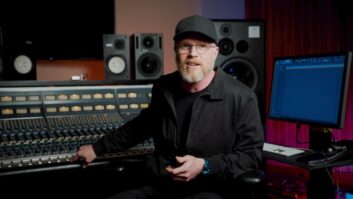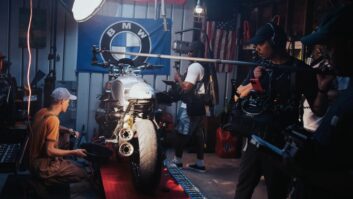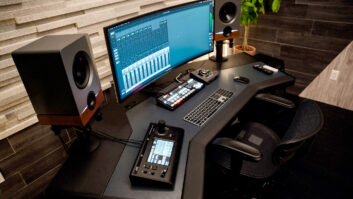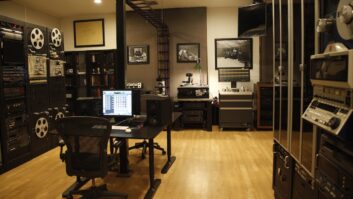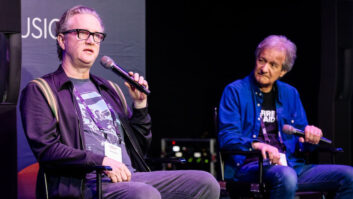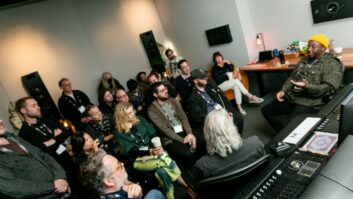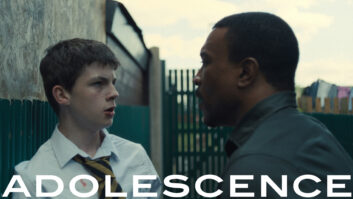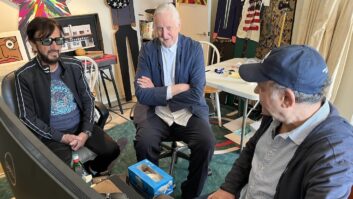
Toward the end of 2018, a report issued by communications regulator Ofcom confirmed just how rapidly the podcast market has developed in the UK. Between 2013 and 2018, the number of weekly podcast listeners almost doubled, from 3.2 million to 5.9 million. The steepest rise was among young adults aged 15-24—with around one in five (18.7 percent) listening to podcasts every week.
Comedy was found to be the most popular genre, followed by music, film and TV. With research group Ovum recently predicting that global monthly listener figures will hit 1.85 billion by 2023, it’s clear that the podcast is now a permanent and substantial fixture of the media landscape. And if the recent explosion in titles is anything to go by, comedy is certain to remain one of the format’s most dynamic contributors.
Right Time, Right Format
Joel Morris has been a leading comedy writer for two decades, contributing to programs including Charlie Brooker’s Screenwipe and That Mitchell and Webb Look, co-founding the sublime local newspaper parody The Framley Examiner and co-authoring, with regular writing partner Jason Hazeley, the hugely popular series of Ladybird books for adults.
He is also the co-founder of podcast company Great Big Owl and believes that the podcast boom has resonated with comedy writers and performers for several primary reasons. All of the Great Big Owl founders “come from a radio background and we had noticed that it was taking a long time to get new projects away. You could be looking at years from having the initial idea to the actual broadcasts.” Shorter runs of one, two or four episodes were also becoming more common, making it harder to generate lasting momentum behind fresh ideas.
For Great Big Owl, the breakthrough moment came “a few years ago when we were at the Edinburgh Festival sitting on a wall in the Pleasance, talking to Dan Skinner [the comedian best known for his character Angelos Epithemiou] about an idea for a show with Harry Peacock. They were thinking of taking it to Radio 4, but we said that we were starting a new podcast company and could get the show out there in only three weeks—which is what we did.”
The resulting podcast, Brian & Roger, revolves around answerphone messages between the two eponymously-na

med divorcees. It has proved a notable hit for Great Big Owl, whose range of titles now encompasses everything from Morris and Hazeley’s own Rule of Three—in which comedians discuss their favorite comedy programs or films—to Always There, an unexpectedly forensic examination of 1980s cult TV drama Howards’ Way.
For all of their writers and performers, the podcast format has proven to be “incredibly engaging creatively, and so much quicker. It’s often the same kind of impulse you would have to do a show at a small theatre or a stand-up night, allowing you to try out new ideas and material. No one expects it to be perfect or for you to worry about every word you say; you do the best you can.” Then, once the program has been made, “there is no going through the compliance and censorship processes that you have with a normal broadcaster.”
It is perhaps inevitable that there will eventually be a period of consolidation in a market that has seen such phenomenal growth, and the impact this will have on the visibility of smaller operations and independent producers is hard to predict. But, at least for now, “one of the most exciting aspects is that it is a level playing field. If you made an independent film it would be a challenge to have it distributed alongside the latest Star Wars. But a new podcast can be on your phone next to the top ten podcasts and the output of the BBC and Amazon.”
DIY Philosophy
The advertising now carried on some of the leading comedy titles—for example, My Dad Wrote a Porno, which had received 200 million downloads as of 2019—confirms that, at least for a few of the major players, podcasting is now becoming a lucrative activity. “There is a Premiership of titles, where you have a group of people making a proper living out of it, then a pretty long tail-off behind that before you reach everyone else,” observes Morris. “But then that’s really the same with most types of creative endeavors, where the top five titles earn most of the money.”
Morris believes that the engaged nature of podcast audiences means that a greater share of titles will start to generate meaningful revenue in the future. For now, requiring comedians to record and produce their own titles is a “budgetary necessity. We have always said we could not propose to do things the way that official broadcasters do—the only way to get it done is if you do it yourself.”
This need for self-reliance is leading to the acquisition of some valuable new skills. Writer/performer Anna Crilly had never undertaken any audio editing before she started work on Great Big Owl’s Heavy Pencil, which takes the form of a series of conversations between theatrical agent’s assistant Sarah Tiptree and actor Michael Cork, whose days of greatest employment are firmly in the rear-view. Written and performed by Crilly and long-time friend Tony Gardner, the project began in downtime when both actors were working on Horrible Histories: The Movie.

Crilly’s own background as a theatrical agent’s assistant in her late twenties seemed to be an ideal subject; like Sarah in Heavy Pencil, “I was kind of awful at it and would make terrible errors, although I loved the team I worked with and have remained in touch with them.” She also noticed how many older male actors had found that “the work had all but dried up and they were having to take part-time jobs”—a primary inspiration for Michael.
The podcast is an entirely DIY operation. The first draft tends to be written by Crilly, who will then send it to Gardner. With the actors based in Essex and East Sussex, respectively, “we plug our headphones into our iPads. I then phone him and we press play on our iPhone dictaphones. We each record the entire episode, ensuring there is no voice bleed, and Tony sends me his file over. I then edit both of them together using GarageBand and start layering up the effects,”—which in the first series of eight episodes runs the gamut from office noises to the sub-bass backdrop of a music festival.
“I had never done any editing on audio or screen before, so I took a few weeks to learn GarageBand—and in fact I am still learning it now. It’s very much trial and error, but there have been some nice comments [about the audio production], which is obviously great to hear,” says Crilly.
Responses and Recommendations
There is general agreement that the increasingly prohibitive costs of staging shows during the major festivals, such as Edinburgh, will remain a primary driver of the comedy podcast boom. Meanwhile, for writers and performers eager to make genuinely creative comedy, the podcast format will continue to provide an opportunity to tap into an engaged and curious audience.
One of the great strengths of podcasting, concludes Morris, is that “one title will often recommend another. At Christmas we did a Secret Santa, whereby every subscriber to one of our shows received another title to download, and that worked really well.” Coupled with the fact that the “barriers to entry are zero, as you can record a great-sounding podcast at home, it’s apparent that this is going to remain a very exciting sector.”
Choice Cuts: Five Great Comedy Podcasts
1 Adam Buxton: Delightful conversational podcast, interspersed by Buxton’s brilliant homemade jingles and ads. The two-parters with Chris Morris and Brian Eno are highly recommended.
2 Heavy Pencil: As discussed, and perhaps best sampled with Episode Three, featuring Michael Cork’s ill-advised sojourn to appear in new play Elsie’s Pancreas at the Latitude Festival.
3 Dear Joan and Jericha: Hilarious, risque podcast in which Julia Davis and Vicki Pepperdine play agony aunts dispensing highly questionable advice.
4 Athletico Mince: Bob Mortimer and Andy Dawson’s podcast continues to reach new heights of surreal brilliance.
5 RHLSTP with Richard Herring: Recently passing the 250-episode mark, RHLSTP is now a formidable archive of comedian interviews. The episodes with David Mitchell and Greg Davies are great starting points.
This story originally appeared in Pro Sound News sister publication Pro Sound News Europe.
